At some point in your artistic career you will hear about artist grants. You know, money given to you so you can make art. Not selling. Not a commission. No, simply money given to to you so you can keep doing what you love to do: make art. If you are like me, at first you didn't even know these kinds of things existed. And when you did, you thought: how the hell do I get into THAT racket? I would hear stories from time to time from fellow artists, or those who knew artists, to the tune of: "Yeah, so-and-so got a grant to do what-the-heck-ever for $15,000! Or: "So-and-so lived for a whole year on such-and-such a grant!" I would hear these anecdotes and think: how the hell do I get into THAT racket?
But when I did find out about a grant and applied for it, I got turned down. It was a local art project grant for a modest sum. I filled out the form, attached the slides (remember those?) sent the thing in, and a month or so later got a written rejection. "We regret to inform you that your project was not chosen to receive funding. Please apply again!" or some such cheery twadle. Well, I thought, dejected, I'll never get one of those! What's the point of even trying for these things--I'll just get rejected. Why make the effort? Why bother?
I had applied to ONE GRANT and got rejected and I was ready to throw in the towel. That was my mind set. Other artists get grants and have their projects funded. Not me. I'll never get one. I've never won anything in my whole life, except maybe a goldfish at a carnival once.... Sad. Really sad, man.
A lot of artists feel this way. I know several. One or two negative experiences color their entire world view as an artist. It colored mine for years, so I know the feeling. Some go to their graves bitter, feeling dejected, feeling overlooked, feeling it's all a scam, and only the "popular" or "connected" artists get funded, and that the only way to get grants is to have already gotten them so that you're "in the system" or vetted. And so on and so forth. This same victim's view extends to the art world entire for many of these folks. It's all just a big fat scam and the fix is in.
Well, if you are one of those, I've got a message for you: get your shit together and stop being a whining brat. Like anything worthwhile, writing a compelling grant proposal takes work. You know, kinda like a lot of things in life that are worthwhile take work.
So, for me--Mr. I'll-never-get-a-grant-so-why-even-try--there came a time years later when I gave it another go. Think it was 2006. I was born in 1960. You do the math. A little late in my career to wise up. Anyway, I got a card in the post informing me that funding for artist's proposals was now open, and that I should consider applying. I thought about it. The amount of funding was pretty good. Up to $10,000.
What the Hell, I thought. Why not?
I sent in for the packet. I got a thick 9 x 12 envelope in the mail. It was bulging with double-sided sheet after sheet of info, along with the application itself, which I think was at least 5 or 6 pages long. It was intimidating. It was dense. I had to summarize my project. I had to give a detailed description of what I wanted to do, a timeline of how it would unfold over how many months, declare whom was my intended audience, did I have a venue to display the work, what effort would I make to reach as large of an audience as possible, what neighborhood did I reside in, what was my ethnicity, on and on. If accepted, I would need to obtain a business license since I would be in essence a contractor paid through the city bureaucracy. Oh yeah, and I had to furnish a detailed budget with confusing columns and things like "in-kind services" that had to be factored in and tallied. My heart sank. They wanted so much information. Jesus, I thought. This is going to be hard.
So, I sat down and went to work on that son of a bitch. It dawned on me then that a large part of an artistic career might be applying to and filling out these things. That would be time not actually making work. In fact, it would be rather different from the studio. It would be writing--a whole other discipline--trying to justify on paper why you or your project deserved precious funding. Oh, and the competition is just a little fierce.
Anyway, I made filling out that grant application my new job. I worked on it for weeks and weeks. I polished it to a gleaming diamond, going over it again and again and again. Tweaking, clarifying, tightening, going over every period and comma. I even went to a grant review seminar and had actual professionals from the Mayor's Office of Arts and Culture--the entity that was administering the grant--review my application. I got some valuable insight and tidied my proposal up some more. I asked for $7,200 for my project. Was that too much? Could I go for more? I had no way of knowing. At last I thought it was as ready as it could ever be, so I went to the post office, gave the manilla envelope to the clerk, saw him toss it into a bin and thought: well, there it goes....
As you might have guessed, several weeks later I got an envelope from the Mayor's Office informing me that CONGRATULATIONS YOUR PROPOSAL HAD BEEN ACCEPTED!
I was giddy. I was floating on a cloud. I could not believe it. It was my first real effort and it had actually worked. I felt special and apart. I told my friends and coworkers. I suddenly was one of those artists I had heard about!
I went on to attain several more grants over the years--a few for hefty amounts. Some of that money kept me alive when the economy was in the tank, and even my day job in peril. Now I never miss an opportunity to apply. But I have to tell you that I am rejected far more than I am accepted. FAR more. It's just how it goes. There are only so many parking spaces, as a friend of mine once said. And I've learned some things about this specialized corner of the artist's world. You have to be convincing. You have to be concise, and not resort to phony bullshit art-speak to justify your request. These people are not simple. You have to make a pitch. Tell them why you deserve funding. Tell them how it will aid you and enhance your career. And be creative. Don't just tell them I need paint, beer, and a canvas--even if that is what you need. Tell them a story. And make it interesting. Don't be a lazy ass with bad punctuation, misspeled werds, lame awkward sentences and crappy images of your art. Do some work, for crying-out-loud. Be a professional and not a crybaby with a lofty air of entitlement because you are an ARTIST. No one owes you shit. And you can take that to the bank.
So, now I can tell you that I have recently been made a Fellow of the John Simon Guggenheim Memorial Foundation. That's right, I'm a Guggenheim Fellow. This is a hugely competitive and prestigious accolade in the world of Arts, Scholarship and the Sciences. I really can't overstate how important this is to a person's career and standing. Thousands of accomplished folks from Canada and the USA compete. It is a career- topper. It's The Shit.
Well, Rick, you say, bully for you, dude. But how the hell did you achieve THAT?
Honestly, I'm still a bit in awe that it happened at all. Unlike most of those chosen as Fellows in my field of "Fine Arts," I did not graduate with an MFA or other diploma from an esteemed Art School, like Yale, or RISD. I am not represented by top-tier galleries in New York and elsewhere, as are many of those other folks. I did not have a solo exhibition at the Whitney, as one of the recipients has. I have not attended important residencies like the Mac Dowel Colony or Skowhegan, or the American Academy in Rome. No, so it's clearly not my pedigree that got me chosen by the Committee for Selection.
So it must have been something else they saw in my application, resume, and images. Perhaps I was represented in enough exhibitions to demonstrate my ongoing commitment to my career and craft. Perhaps it was the unbroken length of my resume, which dates back to 1987. I'm certain my Recommender's letters helped. Most likely all these things. In the Foundation press release, the President, Edward Hirsch, used words like "best of the best," and the announcement in the New York Times said: "Fellows are appointed on the basis of impressive achievements in the past and exceptional promise for future accomplishment." Talk about an affirmation of all your endless hard work and commitment. Word.
Well, short story is, I approached the Guggenheim opportunity the way I do every opportunity. I try to make each proposal--large or small--a glittering diamond of clarity and brevity, have it be as compelling as words and images can make it. I try to kill it every time. I always swing for the fences. Part of my competitive nature, I suppose. Also, I've applied four times before. Not that that matters; the Committee for Selection is comprised of different professionals each year. So, even if I had not been selected, I would dutifully apply every year until I croaked. That's my way, anyhow.
Sometimes it works.


